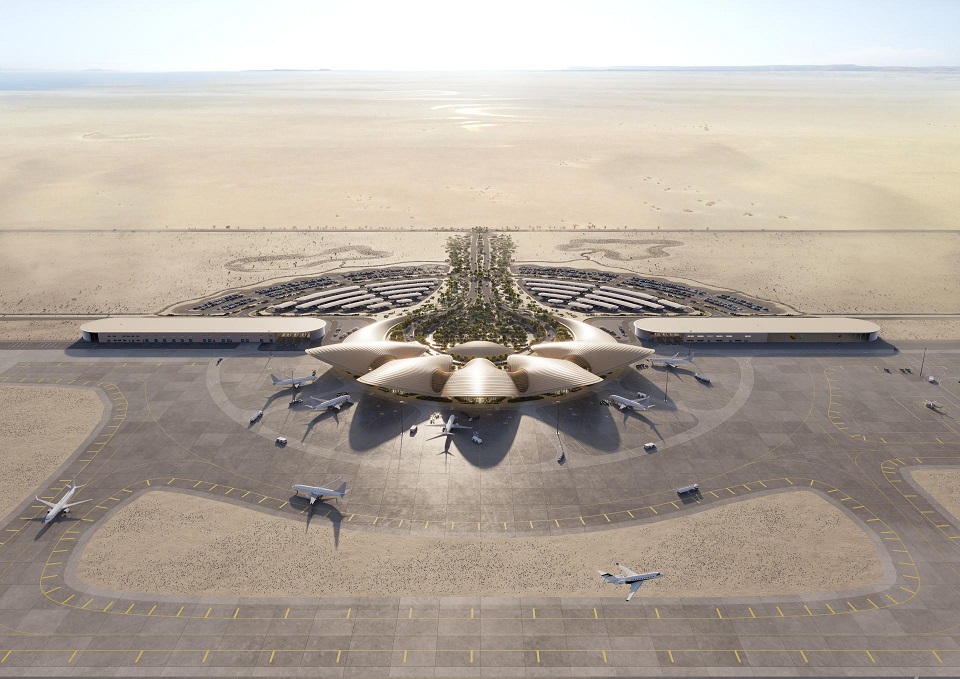Moment marks significant milestone for Red Sea Global, as it opens first direct international connection to The Red Sea destination.
New twice-weekly service, operated by flydubai, commences from DXB to RSI on 18 April.
Red Sea Global (RSG), the developer behind regenerative tourism destinations The Red Sea and AMAALA, has announced it is preparing to welcome its first international flight to Red Sea International Airport (RSI).
Operated by flydubai, the flight will arrive from Dubai International (DXB) on Thursday, 18 April, marking the start of a new twice-weekly route to The Red Sea destination. A regular schedule of domestic flights operated by Saudia have been servicing RSI since September 2023. With the launch of flydubai, there will now be eight flights per week to RSI.
“Situated within three hours flying time of 250 million people, RSI will serve one million guests a year at full capacity. Our inaugural flight just six months ago was the start of our journey towards reaching that goal, and this first international flight is a further step in making Saudi Arabia one of the top tourism destinations globally. We are looking forward to truly opening up to the world and welcoming visitors from the UAE, wider Middle East region and beyond,” said John Pagano, Group CEO at Red Sea Global.
“RSI is also essential for providing connectivity for our employees, partners, and the wider local community,” added Pagano.
RSI was built to provide an easy route for guests travelling to The Red Sea. Today, two luxury resorts are open at the destination: Six Senses Southern Dunes, The Red Sea, and St. Regis Red Sea Resort, which recently welcomed legendary footballer Cristiano Ronaldo and his family.
Three more resorts are on track to open this year, including Nujuma, a Ritz-Carlton Reserve – one of only seven worldwide – in the coming weeks. This will be followed by Shebara, featuring a remarkable array of overwater, stainless steel villas, and Desert Rock, a spectacular resort nestled between the mountains.
Michael White, Chief Commercial Officer of Red Sea International Airport, said: “The arrival of international travelers represents an exciting next phase in RSI’s development, following our first domestic flights touching down in September last year. We are committed to providing exceptional services to passengers and airlines alike and we look forward to further expanding our network to serve The Red Sea and travelers from around the world.”
RSI is on track to become the first carbon-neutral airport in the Middle East. Innovative sustainability solutions are being implemented across all operations to eliminate and offset carbon emissions, optimize energy consumption, and advance efficiencies in resource and waste management.
These include the use of local materials during the design phase, incorporating elements such as 100% renewable energy for the building to meet minimum LEED Gold Certification standard, and minimizing light pollution to meet the Dark Sky Guidelines
Another feature of RSI’s innovative design is its terminal set to open in full next year, which is divided into five ‘mini terminals’ that can be operated independently or concurrently depending on demand. This reduces the building’s energy use when compared with a standard centralized terminal approach.
Sudhir Sreedharan, Senior Vice President, Commercial Operations (UAE, GCC, Subcontinent and Africa) at flydubai, said: “flydubai becomes the first carrier to operate to Red Sea International from the UAE, offering passengers direct access to Saudi Arabia’s resorts at The Red Sea destination. This underscores our commitment to opening up underserved markets and further connecting the regions we operate to via Dubai’s aviation hub.”
Upon full completion in 2030, The Red Sea will comprise 50 resorts, offering up to 8,000 hotel rooms and more than 1,000 residential properties across 22 islands and six inland sites. The destination also includes luxury marinas, golf courses, entertainment, F&B, and leisure facilities.
The Red Sea destination is powered off-grid with 5 solar farms containing 760,000 panels, and one of the world’s largest battery storage facilities already built and operational.


